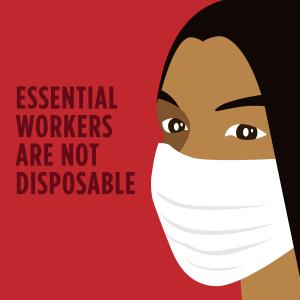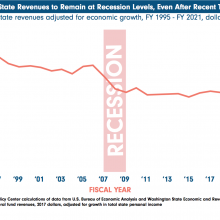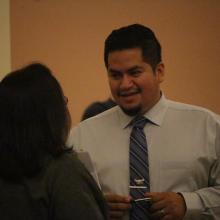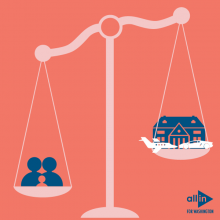
Whether you contracted it or not, COVID-19 has severely damaged our livelihoods. It has greatly limited our daily interactions and has put a pause on our “normal” day-to-day operations. This virus has disrupted families, our daily lives, and our communities. While we may be experiencing the effects of the virus in different ways, one thing is constant: there is a common sense of fear. Fear stems from the virus itself and from socioeconomic side effects such as displacement in the workforce, impending evictions, food insecurity, inadequate education for the working class, etc.
This fear of COVID-19 is matched with a movement that will no longer accept the racial injustices our systems uphold. The global pandemic and the Black Lives Matter/Defund the Police movements (all while under the Trump Administration) have turned everyone’s heads towards these issues. In a matter of months, we went from perfecting our sourdough recipes to collectively learning how to divest from the police.
We’ve arrived at a common understanding that communities of color have been neglected, and investments have been directed towards racist structures. While people in our state are facing housing insecurity, the police department is sitting on a hefty budget. The Seattle Police Department has easily blown $6 million on tear-gassing people during the first 3 weeks of protesting for Black Lives Matter. Why are people still struggling to scrape up money for rent, food, and healthcare?
Imagine how far $6 million could go if it were invested in communities. A call for community safety sits on the table. Police are so ingrained into our daily lives that some can’t fathom how defunding the police could possibly bring more safety to communities. However, police are only Band-Aids meant to cover deep wounds in our communities. Band-Aids don’t prevent injuries. Likewise, the police do not actually prevent crime - they react to it.
The real safety issues stem from the structural racism that has left non-white school districts with 18% less funding per student than white school districts, resulted in Latinx people constituting 44% of COVID-19 cases, caused 1 in 10 renters to be unable to pay their rent in May, and left our most marginalized populations suffering and neglected.
The only way to prevent these damages is investment in community safety - investment in youth development and education, investment in mental health services, investment in housing, investment in environmental justice, investment upstream.
Furthermore, these same services are facing serious threats as our state is creeping up on a $9 billion shortfall due to COVID-19. There are still some populations in our state that currently lack community funding and have zero protections against COVID-19. The west side of WA is so disconnected from its Eastern counterpart that it’s hard to depict the conditions farmworkers are stuck in.
Julio Romero, a longtime activist and former president of WA State Farmworkers Union, highlights the stark disparities in healthcare protection for farmworkers in Wenatchee. He shared that alongside 82% of COVID cases affecting Latinos, farmworkers have limited access to facemasks and self-isolating in homes is nearly impossible. A two bedroom home could house eight family members, making "social distancing” exceedingly difficult and allowing the virus to spread easily. Furthermore, many workers who contracted COVID-19 are stuck at a crossroads between losing wages by not working, or continually working through the sickness and risk . No one should ever have to choose between their health or their means to survive. Our essential workers are not disposable.
COVID-19 has exposed the already inequitable funding, and BLM/Defund the Police has highlighted the need for the redistribution of the overly funded police budget into community programs. However, another agent of marginalization is often left out of the conversation - Washington’s regressive tax system.
The move to push forth progressive revenue shares the same goals of COVID-19 relief and defunding the police. We need to create a just environment that allows everyone to thrive. When it comes to progressive tax structures, Washington state comes dead last. The poor and working class pay 7 times more of their income in taxes than the wealthiest Washingtonians.
Our very own Jeff Bezos has profited tremendously off of COVID-19, bringing in $74 billion from the start of the pandemic. He is projected to be the world’s first trillionaire by 2026. With 30% of his projected net worth ($300 billion), he could single handedly stop greenhouse gas emissions and buy us up to 20 years to combat climate change. With 17.5% ($175 billion) he could end world poverty for 20 years. With just 3% ($30 billion a year), he could end world hunger.
We have people in our state whose net worth is more than some countries’ entire GDP! This begs the question: what the hell is going on in Washington?
It is no coincidence that Washington is home to 12 billionaires and 2 of the richest people on this planet! Washington state has nearly 700 tax breaks and special deals for the wealthy, while being one of nine states who do not have a capital gains tax. A capital gains tax is a tax levied on the sale of non-inventory assets. This means when “non-inventory assets” like stocks, bonds, precious metals, property, and real estate are sold, a tax is imposed on those sales.
It is also no coincidence that non-inventory assets are bought and sold predominantly by wealthy white people. To understand how we’ve arrived at such massive wealth disparities in Washington, we also must understand the context of our racially discriminatory history.
Since slavery, white people have accumulated generational wealth, creating an alarming exclusivity of money-hoarding to white people. Washington state has a deep history of racial discrimination and has not supported the financial stability of BIPOC people. From racially restrictive covenants that denied housing in certain neighborhoods, to redlining that denied housing loans depending on race, racist policies have created a massive wealth disparity in our state.
The compounding issues that COVID-19 and police brutality has brought upon us leave us with a unique opportunity to restructure our systems. Divesting from the wealthy and our racially oppressive police force is not only the equitable way, it is the logical way to move forward and ensure we all thrive. This pandemic will not go away until our most marginalized communities are granted security in housing, food, climate protections, and mental health resources.
Cleaning up our tax code will allow Washington to provide these vital protections in a way that benefits all of us instead of just the wealthy few. A tax code that eliminates loopholes and prioritizes economic justice will create a long-term healthy Washington state.
In 2008, our state made the mistake of allowing knee-jerk cuts to public health and education services, and we haven’t truly recovered. At the end of the Great Recession 2011, more than 70,000 working adults in Washington lost health care coverage, roughly 20,000 people with disabilities who were not able to work lost income support, about 7,000 parents lost necessary child care support, and at least 20,000 adults lost workforce assistance that helped them get and keep jobs. The exacerbated financial insecurity brought forth worsened health outcomes like increased blood pressure, poor mental health, and increased suicide.
2020 has slammed us with unprecedented health crises compounded by economic devastation. The lasting effects of 2020 could result in worsened cycles of poverty and health, or we can come out on top as a thriving state. We cannot make the same mistakes we made after the Great Recession.
So how can we move forth from the devastating shortfalls 2020 has brought us?
Investing in programs that are indirectly related to healthcare is the only way forward. We need to create an environment that allows everyone to thrive. We must increase SNAP benefits and food assistance, invest in affordable housing, invest in public education, and provide cash assistance. We can only stream money into these programs by cutting back on funding for racially discriminatory institutions, taxing the wealthy in our state appropriately, and reinvesting in the overall wellbeing of our communities.
Our state does not have to suffer. We can create an environment where everyone wins. Despite the uncertainty that 2020 has conjured up, there are known routes to building a safe and equitable future for us all. We have the wealth in our state and we have the tools. We need to align our progressive reputation with our policies to truly allow for an environment in which we all can thrive.
Continue to pay attention to local elections for legislators who will push for progressive revenue. Continue to apply pressure to our lawmakers to reject knee-jerk cuts. It's time to restructure our broken tax system. Continue to educate yourself and each other. Investments in community are our only chance for a just recovery from both COVID-19 and the history of racism in our state.
Sources:
Adam Majendie & Pratik Parija, “How to Halt Global Warming for $300 Billion,” Bloomberg, October 2019, https://www.bloomberg.com/news/articles/2019-10-23/how-to-halt-global-warming-for-300-billion?utm_medium=social&utm_campaign=socialflow-organic&cmpid=socialflow-twitter-business&utm_source=twitter&utm_content=business
Carter Coudriet, “The States With the Most Billionaires,” Forbes, April 2020, https://www.forbes.com/sites/cartercoudriet/2020/04/09/the-states-with-the-most-billionaires-2020/#5192f1a4392a
Center on Budget and Policy Priorities, https://www.cbpp.org/covid-19-state-budget-shortfalls-could-be-largest-on-record-5
“Investments Today Can Lead to Better Health Tomorrow,” Washington State Budget & Policy Center, July 2020, https://budgetandpolicy.org/resources-tools/2020/07/Investments-Today-Can-Lead-to-Better-Health-Tomorrow_July-2020-1.pdf
Leen Abdallah, “The Cost to End World Hunger,” The Borgen Project, February 2015, https://borgenproject.org/the-cost-to-end-world-hunger/
“No Poverty: Why it Matters,” United Nations, https://www.un.org/sustainabledevelopment/wp-content/uploads/2018/09/Goal-1.pdf
Tyler Sonnemaker, “Jeff Bezos is on track to become a trillionaire by 2026- despite an economy-killing pandemic and losing $38 billion in his recent divorce,” Business Insider, July 2020, https://www.businessinsider.com/jeff-bezos-on-track-to-become-trillionaire-by-2026-2020-5
Graphic by Meg Wiedl






